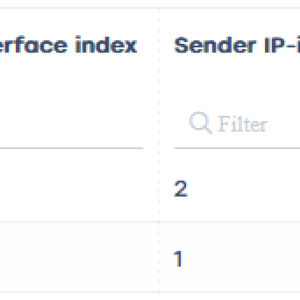This is an old revision of the document!
Description of QoE metrics
Netflow
| Metric | Description | Values |
|---|---|---|
| Octet delta | Traffic difference (bytes) at the beginning and end of the specified period | |
| Fragmented packets delta | Difference of IP packets divided into parts/fragments at the beginning and at the end of the specified period | |
| RTT | Round-trip time is the time taken to send the signal plus the time it takes to confirm that the signal has been received. This round-trip time therefore consists of the time it takes to transmit a signal between two points within a single flow. All network activity within a source/destination socket (source IP:port /destination IP:port) is taken as a flow in DPI | |
| Source AS | AS host number | |
| Destination AS | Subscriber's AS number | |
| Post nat source IPv4-address | An IP address converted from private to public by NAT to communicate with external devices and access the Internet | |
| Post nat source port | A port converted by NAT from private to public for communicating with external devices and accessing the Internet | |
| Vchannel/Bridge | Vchannel — vChannel number. Bridge — number of the bridge through which the traffic goes | |
| Service class | Traffic classes cs0 — cs7. For more details see Traffic distribution by class for the tariff plan | 0 — cs0 1 — cs1 … 7 — cs7 |
| Receiver IP-interface index and Sender IP-interface index | Traffic direction | 1 — to whom traffic is directed; 2 — where the traffic comes from. Example: The first option is outbound traffic; The second option is inbound traffic. |
Clickstream
All Clickstream metrics are defined for HTTP traffic only.
Metrics for HTTPS traffic cannot be defined because it is encrypted.
Metrics for HTTPS traffic cannot be defined because it is encrypted.
| Metric | Description | Values |
|---|---|---|
| Path | The address to which the subscriber went | |
| Referer | The resource from which the request came. Used for redirection: the address from which the user went to the redirection page is memorized | |
| User agent | Allows you to understand from which device the request was made | |
| Method | Server request method | 0 — undefined 1 — GET 2 — POST 3 — PUT 4 — DELETE |
| Result code | The HTTP code that the server returned | 200 — ОК 403 — Forbidden |
| Content length | How many bytes of information the server returned in response to the request | |
| Content type | Content-Type in HTTP, used to define the MIME type of a resource | |
| Locked | Bitmask, contains an indication that the resource has been blocked or redirected | 0x3 for HTTP 0x1 for the rest |
| Host type | 1 for HTTP 2 — CNAME 3 — SNI 4 — QUIC |
DNS Flow
| Metric | Description |
|---|---|
| Host | DNS host domain name from the DNS response |
| Host category | Category of the involved host, determined automatically |
| Total | Number of records from the raw log, grouped into a single entry in the aggregated log |
| Sessions | Number of internet sessions of the subscriber in the aggregated log |
| Hosts | Number of hosts in the aggregated log |
| Host categories | Number of host categories in the aggregated log |
| DNS hosts IPs | Number of unique IP addresses of DNS hosts |
| Logins | Number of logins in the aggregated log |
| Subscribers | Number of subscribers in the aggregated log |
| Channels | Number of vChannels in the aggregated log |
| Time | Time of session start |
| Session ID | Session ID |
| Login | Subscriber login |
| Source IPv4-address | Information about the source of the request. The source can be either a subscriber or a host |
| Source IPv6-address | |
| Source port | |
| Destination IPv4-address | Information about the recipient of the request. The recipient can be either a subscriber or a host |
| Destination IPv6-address | |
| Destination port | |
| DNS transport | Protocol used for transmitting DNS requests |
| DNS host IP | DNS host domain name from the DNS response |
| DNS host port | IP address of the DNS host |
| Subscriber | Port used by the DNS host |
| Subscriber port | IP address of the subscriber |
| Rrclass | Port used by the subscriber |
| DNS type | Resource class (RR Class) in the DNS request |
| TTL | Indicates the function of the server in processing and storing DNS requests in the domain name system: 1 - A 5 - CNAME |
| DNS data | The acceptable time for storing this resource record in the cache of a non-responsive DNS server |
| VLAN ID | RDATA encoded in base64. For example, it is possible to find out which IPs belong to the host |
| Post VLAN ID | Unique identifier of the virtual local area network |
| DPI ID | VLAN ID after route change |
| Vchannel/Bridge | Number of DPI, taken from GUI: Administrator → Equipment |
| MPLS labels | Channel — number of vChannel. Bridge — number of the bridge through which traffic flows |
| Labels for routing packets in MPLS networks |
Was this information helpful?



